SPOTLIGHT
Face to Face – Professor Soraya Seedat on the ‘workings of the brain’ and the realities of psychiatry in SA
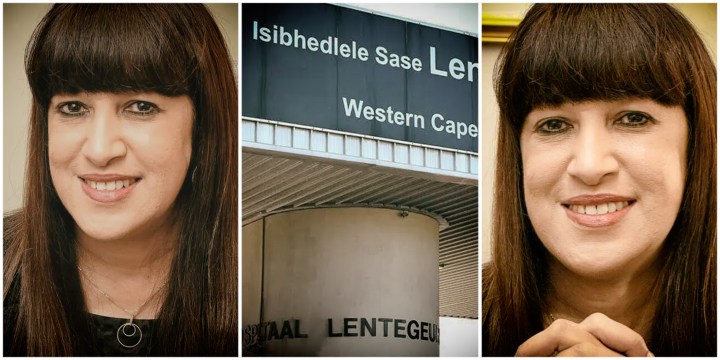
Professor Soraya Seedat is a distinguished professor and head of Stellenbosch University’s psychiatry department. She has penned several hundred peer-reviewed journal articles and book chapters on psychiatric disorders, with a focus on PTSD and anxiety, particularly among children and in resource-constrained settings. Biénne Huaisman spoke to her about her work, what drives her, and maintaining a work-life equilibrium.
Behind Professor Soraya Seedat’s desk in her office on the University of Stellenbosch’s Tygerberg campus in Parow, hangs a striking gold-framed painting by a patient diagnosed with schizophrenia. It shows abstract curves and angles in bright colours against a dark background. It is a relic of Professor Robin Emsley’s tenure, her predecessor, who specialises in schizophrenia.
Seated at a small boardroom table inside her uncluttered office, we are discussing premature death in people living with mental health conditions. Seedat is relaying how people with mental illness may die early due to suicide or deteriorated health conditions exacerbated by simple factors such as poor diet and not getting enough exercise. She points out that an estimated 10% to 15% of people with mental health disorders commit suicide and that Africa has the highest suicide rate in the world.
“This is a space for much more research,” she says. “But what we do know is that there are many social determinants that come into play, such as poverty, income inequality, food insecurity and violence, especially in other African countries where there may be fewer restrictions on access to arms and ammunition.”
Really, what we need are packages of healthcare, not care in silos.
She is not working on these issues alone. A paper on the early death risks of people living with mental health illness, co-authored by Seedat and 39 other global experts, was published last month in the journal Lancet Psychiatry. The article proposes several solutions. Speaking to Spotlight, Seedat argues that a non-siloed approach to mental healthcare is key. “This is currently under discussion in South Africa, with quite a lot of traction within the Western Cape department of health. We really have to integrate mental health into physical healthcare at primary care level,” she says.
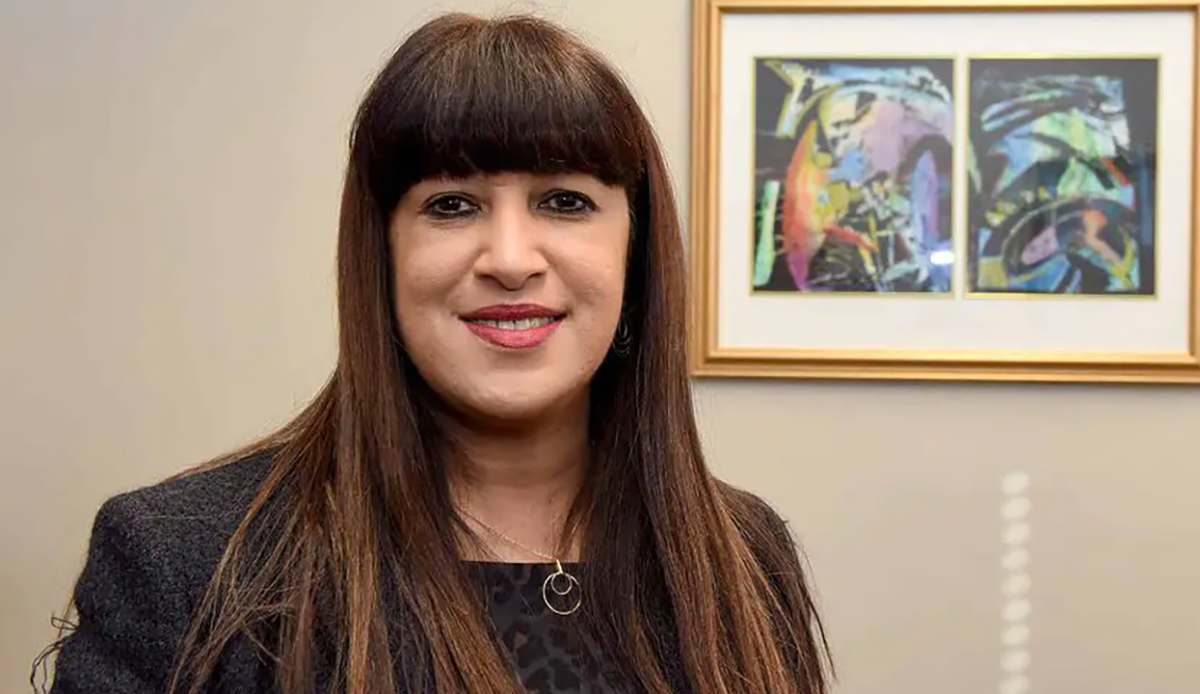
Professor Soraya Seedat has penned several hundred peer-reviewed journal articles and book chapters on psychiatric disorders, with a focus on PTSD and anxiety. (Photo: Nasief Manie / Spotlight)
“So, let me tell you what happens now in the pathway to care. A patient goes to a community clinic, let’s say, in Bishop Lavis [on the Cape Flats]. And the patient is complaining about symptoms of depression and they have thoughts of harming themselves. The patient would be referred to the psychiatric nurse at that clinic. The psychiatric nurse would assess the patient initially and would then book that patient to see a registrar, essentially a psychiatrist in training who visits the clinic once a week. So the patient is seen and, obviously, time is limited. The patient may not be fully assessed in terms of their physical health. That same patient, maybe a week later, would feel weak. They go to the clinic. Blood sugar is tested and they would be referred to the diabetes nurse at the clinic. But there is no linkage between the psychiatrist and the diabetes nurse – no connection is made between the two. Really, what we need are packages of healthcare, not care in silos.”
‘Understanding the workings of the brain’
It was a year working as a medical officer at Lentegeur Psychiatric Hospital in Mitchells Plain, Cape Town, that persuaded Seedat to carve a career as a “clinician scientist” in psychiatry. It was 1992 and she was 25 years old.
At the time, fresh from medical school at the University of KwaZulu-Natal (UKZN) and having just completed her MBChB internship at Durban’s King George V (now King Dinuzulu) Psychiatric Hospital, Seedat found herself compelled by mental health issues on the Cape Flats – far away from her sheltered Durban upbringing.
Read more in Daily Maverick: Meet Tolullah Oni, the innovative doctor who treats cities
One of four siblings raised in an Indian household, Seedat had been head girl of her primary school and secondary schools, with no real inkling of alcohol or substance abuse. She relays how, while studying medicine, her late father – a former maxillofacial surgeon – suggested that she specialise in dermatology, since he thought this might yield “a better work-life balance”. Instead, she found herself in psychiatric wards working long hours, drawn to “the workings of the brain, wanting to really understand the mechanisms that give rise to mental illness”.
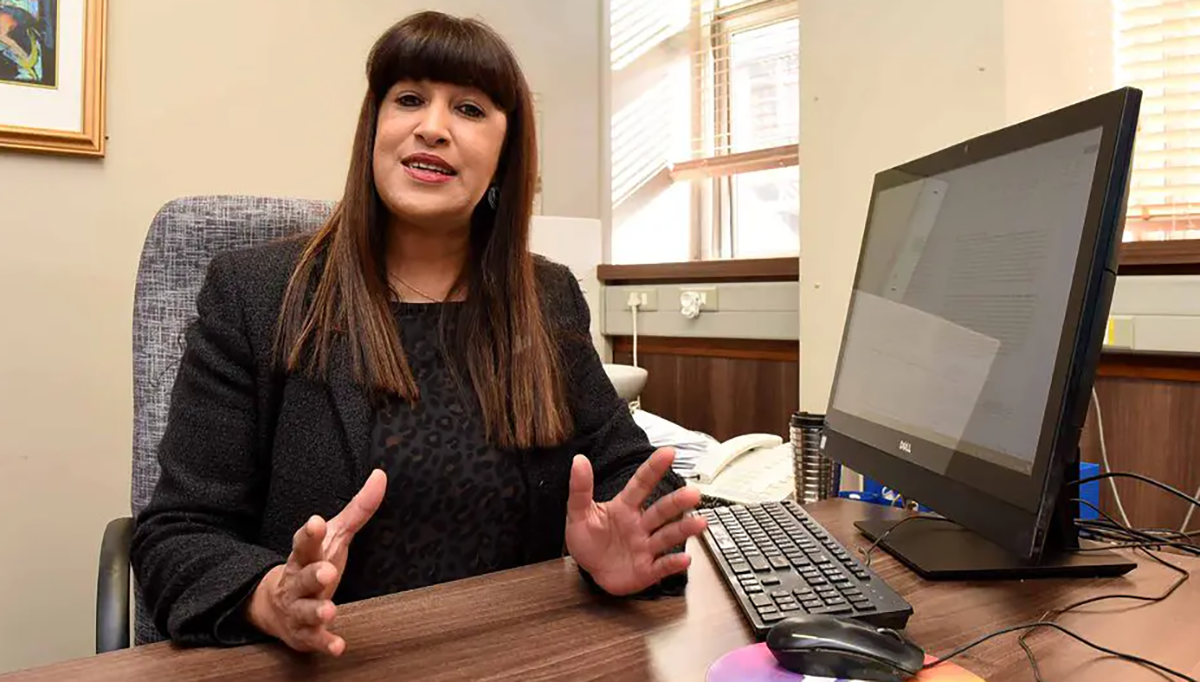
Professor Seedat believes that a non-siloed approach to mental healthcare is key. (Photo: Nasief Manie / Spotlight)
Working at Lentegeur
Today, a leading expert in post-traumatic stress disorder [PTSD] and anxiety disorders with research collaborators around the world, Seedat recalls her time at Lentegeur. “I felt really challenged and I suppose I’m someone who likes to be challenged. Patients admitted were typically psychotic or under the influence of drugs and alcohol. There was exposure to some very violent patients, for example, when I was on call after hours… When you were told that a patient is aggressive and that security is there and that they are trying to restrain the patient – that sense of anticipation, fear and disempowerment that one feels as a junior doctor. I can remember instances where patients were very disinhibited – sexually disinhibited – in that perhaps they will remove their clothes because they don’t have those sorts of boundaries. As a woman, that can be even more frightening than having a patient who is just physically aggressive and restless or threatening verbally.”
A big proponent of multidisciplinary research and “non-silo” thinking in healthcare, back then, Seedat learnt the value of teamwork on the ground.
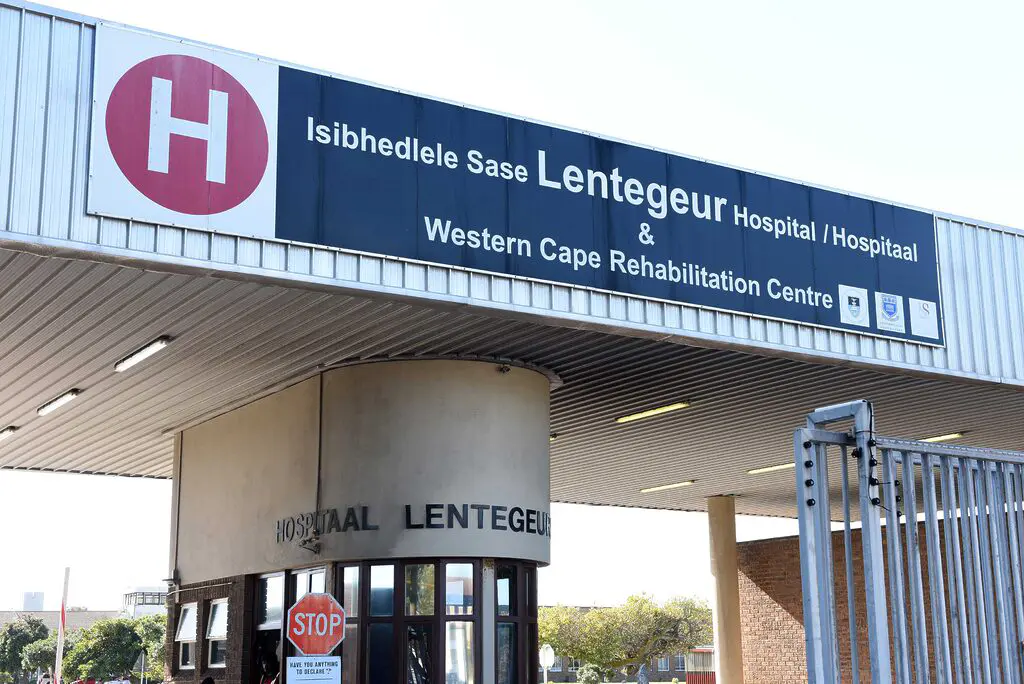
Lentegeur Hospital in Cape Town. (Photo: Nasief Manie / Spotlight)
“In situations of risk, what dawned on me was the reliance you have,” she says. “The patient is also potentially at risk, right? Of hurting themselves. There is that reliance that you have on your team, on security and other staff. All in all, I found it compelling and exciting being in a position where you can make a difference and learn to manage patients more effectively as you become more experienced.”
Seedat’s Durban mentor, Professor Margaret Nair, suggested to her that Stellenbosch University (SU) had a leading psychiatry department she might consider applying to. In a bold move, Seedat contacted the department’s then head, Professor Robin Emsley. “So, being the naïve intern, I contacted him, which, you know, in hindsight, took quite a bit of audacity.”
In 1993, Seedat joined the university’s Department of Psychiatry as a registrar, completing her specialist training. About 30 years later, she is a distinguished professor and head of the department. She has co-authored several hundred peer-reviewed journal articles and book chapters on psychiatric disorders, with a focus on PTSD and anxiety, particularly among children and in resource-constrained settings. She has looked at resilience in stress-related disorders, HIV and foetal alcohol spectrum disorders; also with projects in neuroscience (study of the nervous system) and epigenetics (study of stable changes in cell function that do not involve alterations in DNA sequence).
Read more in Daily Maverick: ‘We are there for the patients’ – meet Dr Angela Hartwig, a torchbearer for rural health
“In [epigenetics],” she explains, “we look at the dynamic interplay between trauma, PTSD, genetics and the environment. Conventional wisdom in science was that we are born with static genes inherited from our parents. But we’ve come to know that genetic architecture is actually amenable to influence, both biological and environmental. While the actual structure of the DNA is stable, through environmental impacts like trauma, poverty, family and societal influences, as well as biological factors, expression of that genetic architecture can change.”
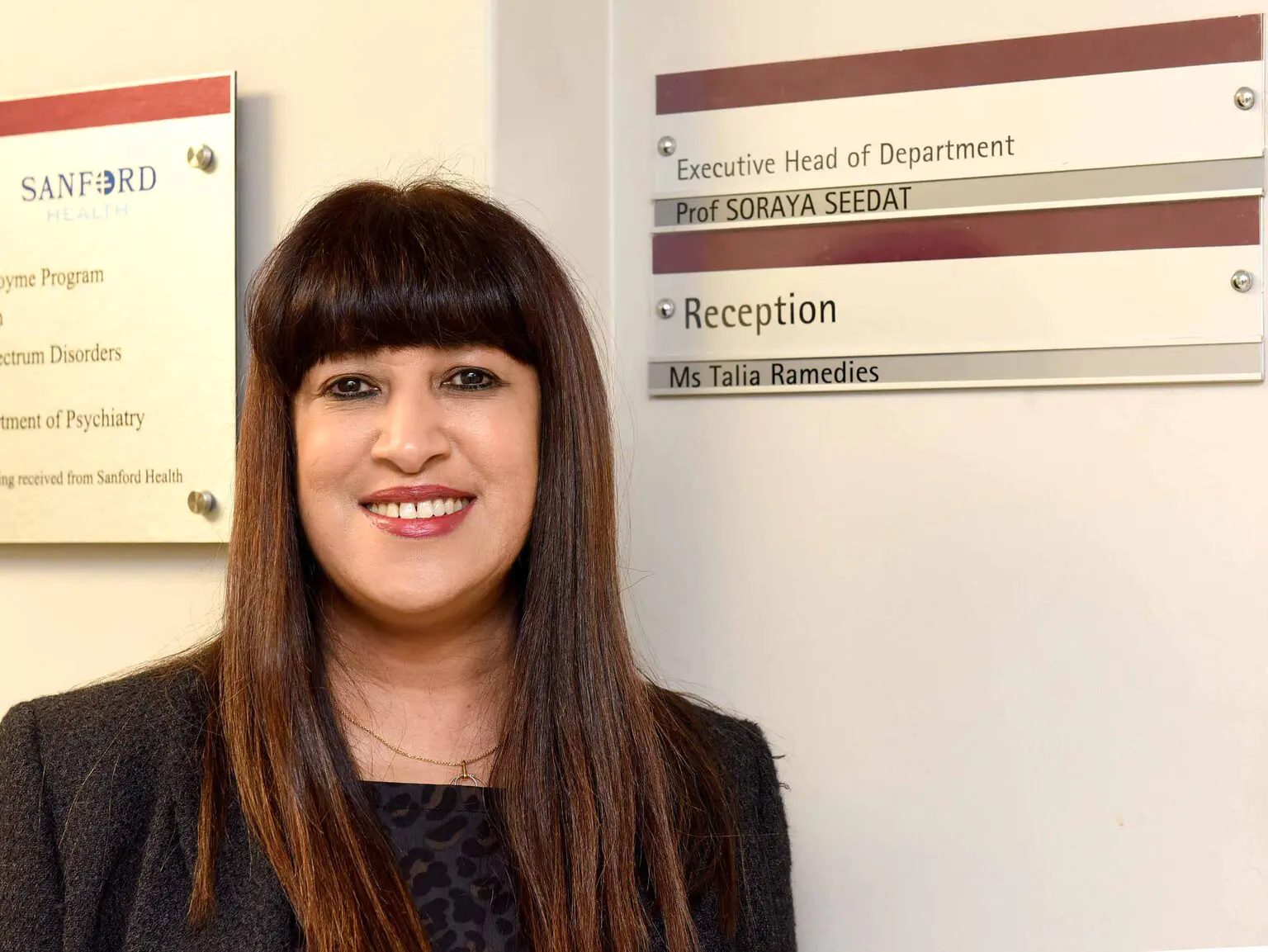
Professor Soraya Seedat. (Photo: Nasief Manie / Spotlight)
Putting career first
Seedat’s posture is upright as she gestures with her hands low over the table, her voice level.
What drives her? “Deep-seated curiosity and impatience,” she says. “Being able to ask very pertinent but also very creative questions about why diseases and psychiatric disorders manifest in the way that they do, why they manifest at all, and in what novel ways we can treat these disorders. Back then, the challenge was clinical [Lentegeur], now I’m challenged by science and innovative developments in the field of psychiatry.”

Professor Seedat is the head of the psychiatry department at Stellenbosch University where she started as registrar in 1993. (Photo: Nasief Manie / Spotlight)
Among many other positions on her CV, Seedat is co-chair of the South African Medical Research Council’s Anxiety and Stress Disorder Unit. Together with her fellow co-chair, Professor Dan Stein, she established the council’s Bathuthuzele Youth Stress Clinic at Tygerberg Hospital in 1999. There, every month, about 10 referred children and adolescents are screened for mental health conditions, following trauma exposure such as physical or sexual violence or witnessing violence. Bathuthuzele means “comfort them”, says Seedat, for whom childhood trauma intervention remains an enduring passion.
Seedat lives in Bloubergstrand. Reflecting on her work-life balance – she sighs, laughing. Work takes up much of her time. “It’s a topic that comes up a lot in my department and especially during Covid, it was a strong discussion point. I don’t have work-life balance; I have what I would consider to be more of a work-life equilibrium, which works for me,” she says.
Putting her career first was an early decision for her, she adds. One that she stands by. DM
This article was published by Spotlight – health journalism in the public interest.





















 Become an Insider
Become an Insider
Comments - Please login in order to comment.